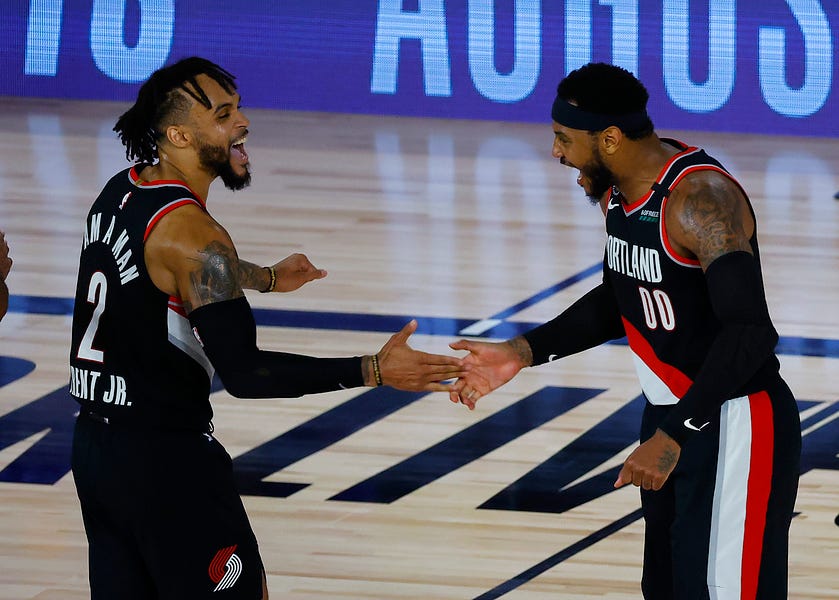I’ve been watching a lot of sports lately. It’s nice to have some return to normalcy, even though there’s really nothing normal about NBA games in August or the crack of the bat in baseball stadiums without a roar of the crowd. (Major props to the Kansas City Royals, though, for putting a cutout of of Bernie from Weekend at Bernie’s behind home plate.)
And it’s occurred to me that the different leagues’ policies on how to play through a pandemic have obvious parallels in how different countries have handled it.
The NBA, of course, is New Zealand. Top of the class. The bubble hasn’t been hermetically sealed—players have had to leave temporarily to deal with family matters, and yeah, a few guys snuck out of their hotels. But there have been zero positive tests among the 342 players who are in Orlando. And the product itself has been pretty darn good. There have been so many exciting games. The decision to play eight regular season games to sort out who gets into the playoffs? That turned out great. Some people thought the league should just bring in the top eight teams from each conference based on the standings as of the time of shut down and go right into the playoffs. That would have been fine, sure, but the drama that has played out over the last couple of weeks has made SportsCenter great again. Look at the Phoenix Suns and the Portland Trail Blazers. Poor Phoenix went 8-0 in the bubble and still missed out on a playoff spot. Their hopes were dashed when Portland, which went 6-2 in the bubble, eked out a 134-133 win over the Brooklyn Nets on Thursday. I’ve sort of adopted the Blazers down this stretch and I was yelling at the TV like it was a playoff game the other night.
Baseball, on the other hand, is more like Sweden. MLB is taking some precautionary measures, players are tested regularly, and some are even wearing masks. Heck, Cubs first baseman Anthony Rizzo has offered squirts of hand sanitizer to opposing players who reach first. But there is no kind of bubble, and there have been big problems. Right away, 14 Marlins players tested positive and the team shut down for a while. The St. Louis Cardinals had nine players test positive, and some went to the emergency room because they had symptoms. The outbreaks have wreaked havoc with the schedule: The Cards, for example, will play seven doubleheaders to make up for lost time. And, because of the condensed schedule, MLB implemented a rule that double-headers will be seven innings instead of nine. It’s not the most egregious affront to baseball tradition we’re seeing this season (don’t get me started on the extra innings nonsense), but it’s also not ideal. Some have called for the league to shut down, but that seems unlikely to happen.
And then there’s the NCAA. It’s the United States, writ small. The organization is like the federal government, and the conferences are like the states. Like the U.S., there’s no coordinated response from the top, and each conference has been left to fend for itself. And conferences are making wildly different choices. Weirdly enough (or maybe not), the geography of who is being strict and who is being laissez-faire largely mirrors what’s happened regionally in the U.S. The Big East (the Northeast), the Big Ten (Midwest), and the Pac-12 (West Coast) have pushed fall sports to spring, while the ACC, SEC, and Big 12 (southern states and Texas and part of the Sun Belt) are forging ahead. Now, it’s fair to argue that, when it comes to football, you still have a good chunk of the top teams in the country playing so any postseason that happens doesn’t require an asterisk. (As an Ohio State fan, I personally wouldn’t argue this, but one can make a case.) But … it’s still kind of insane that it’s split up like this.
And there are few good options. The players desperately want to play. Clemson quarterback Trevor Lawrence and Ohio State’s Justin Fields, who met in the playoffs last year, joined up with other players to start the #WeWantToPlay campaign. Parents from several Big Ten teams have delivered letters to the commissioner begging the conference to reconsider. It’s all a mess.
To keep the analogy going, it’s obvious that the NCAA (like the U.S.) was going to be different from the NBA (New Zealand). The NBA didn’t bring back all of its teams, only those who were in playoff contention. And NBA teams have pretty small rosters. There are only 342 players in the Disney bubble, and that number will shrink now that the play-in games are ending. Some Division I football teams have more than 100 players each, counting walk-ons.
I’m not trying to make a huge point here. But it is worth noting that the NBA shows what can happen with careful planning, an effort to coordinate and get everyone on board, and a high level of testing and tracing. It’s not normal, but it’s doable. It’s better than nothing.
Now, I encourage you to go check out the best stuff we published this week (there’s a lot). I have to go get ready for the NBA Playoffs and try to reconcile that my new favorite team (the Blazers) is taking on my favorite player, LeBron, in the first round.
Joe Biden’s opposition to Medicare for All helped define his candidacy and almost certainly helped him wrap up the nomination. But that doesn’t mean a President Biden wouldn’t steer health care policy aggressively to the left. James C. Capretta, a leading expert on health care policy, kicks off a series we’re doing to examine what a Biden agenda might look like. Capretta cautions that Biden could prop up Obamacare by introducing a public option and expanding Medicare to Americans as young as 60. He writes: Biden “won the Democratic nomination by highlighting the drawbacks of single-payer health care. By so doing, he may have put himself in the position of presiding over the most consequential changes in health care since the 1960s.” In the coming weeks, our series will tackle Biden’s plans on trade, climate change, education, the 9/11 wars, foreign policy, and more.
Don’t say we didn’t warn you! Last month, Audrey Fahlberg profiled a number of GOP candidates who sympathize with QAnon, a crackpot theory claiming that “Donald Trump would be victorious in the battle against the satanic, pedophile, child sex trafficking deep state,” and other conspiracy theories. Welp, Marjorie Greene just won her primary runoff for Georgia’s 14th Congressional District. The district is heavily Republican, so it’s almost certain she’ll win in November. And that is causing headaches for House Republicans. Two days after her win, video emerged in which she claimed there was “no evidence” a plane struck the Pentagon on 9/11. So far, Illinois Rep. Adam Kinzinger is the only Republican who has spoken out against her. Meanwhile, House Minority Leader Kevin McCarthy has vowed to “welcome” her into the GOP conference. Declan talked to soon-to-be-former Rep. Steve King, who’s a little miffed that McCarthy stripped him of his committee assignments in the wake of his bigoted statements but is standing by Greene. Read the whole thing, as they say.
Raise your hand if you had “significant Middle East agreement” on your 2020 bingo card (I did not). On Thursday, the White House announced that Israel and the United Arab Emirates had agreed to normalize relations. Given Israel’s contentious relationship with its Arab and Islamic neighbors, the deal seems surprising. But Charlotte Lawson explains why it makes sense on a couple of fronts for Gulf states to align with Israel. For one, divided Palestinian leadership has been a source of frustration for some Arab states. For another, other regional powers are either seen as adversaries (Turkey and Iran) or are suffering from internal strife that prevents them from being regional allies (Egypt, Syria, and Iraq).
Here’s some other stuff you should check out:
-
We don’t know yet whether the port explosion that killed hundreds in Beirut was an accident or something more sinister. But either way Danielle Pletka says that it “is the product of the corruption, venality and incompetence that has brought the ‘Paris of the Middle East’ to its knees.”
-
We’ve all heard that Texas is getting more “purple,” but that doesn’t mean it’s getting more moderate. Take, for example, the state’s 21st Congressional District race, which pits Tea Party-style conservative Chip Roy against progressive Wendy Davis (who became famous a few years ago for her 11-hour filibuster on a Texas abortion law). That’s the topic of The Sweep’s Midweek Mop-Up (get it, sweep? mop?)
-
In a members-only French Press, David reviews the latest body-cam footage of George Floyd’s arrest, and argues that despite the fact that it shows Floyd under the influence and resisting arrest, it doesn’t let Derek Chauvin off the hook.
-
Finally, the pods: David and Sarah went to space this week on Advisory Opinions. OK, maybe not, but they do a deep space dive with Marina Koren of The Atlantic. Meanwhile, The Dispatch Podcastg oes down the rabbit hole of the QAnon conspiracy theory touted by Marjorie Greene. And while Jonah was on vacation, the Remnant was not. David filled in and talked to Ramesh Ponnuru of National Review and AEI about the “burn it all down debate” and much more.
Photograph by Kevin C. Cox/Getty Images.









Please note that we at The Dispatch hold ourselves, our work, and our commenters to a higher standard than other places on the internet. We welcome comments that foster genuine debate or discussion—including comments critical of us or our work—but responses that include ad hominem attacks on fellow Dispatch members or are intended to stoke fear and anger may be moderated.
You are currently using a limited time guest pass and do not have access to commenting. Consider subscribing to join the conversation.
With your membership, you only have the ability to comment on The Morning Dispatch articles. Consider upgrading to join the conversation everywhere.